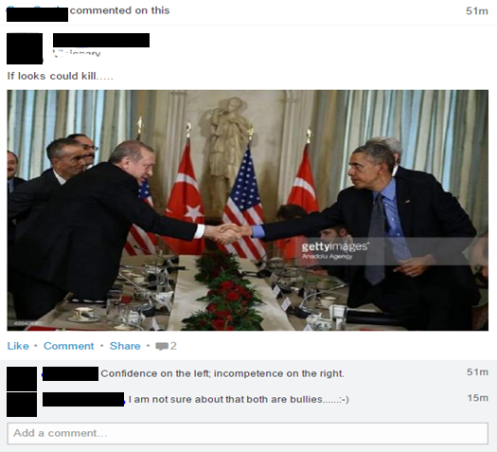INSIDE THE 
NEWS + ADVICE
3 Things Veteran Job Seekers Shouldn’t Like
 You know that LinkedIn is not Facebook. But this means much more than just watching what you post to LinkedIn.
You know that LinkedIn is not Facebook. But this means much more than just watching what you post to LinkedIn.
In addition to the content you post directly, veterans and cleared job seekers need also to be wary of what they “like” and comment on. These actions will actually populate the article, story, picture, etc., onto the news feed of all of your contacts. With your name and photo associated.
Here’s a few examples of things that could potentially send an inaccurate, incomplete, or out of context message to others in your LinkedIn network and how that could potentially hurt a cleared job seeker.
1. Political/Social Issue Memes. When you like or comment on that photo with a pithy statement about how great/horrible Obama is, or how people in this country should have fewer/more gun laws, you’re sending that out to all of your connections.
This isn’t to suggest that job seekers can’t have an opinion, but even “liking” one of these pics puts it out there with your name associated with it. This invites others in your network, including those who may be able to hire or at the very least help you, to make assumptions about you without any context.
Some may agree with your point of view, others may not. Even those who agree with you on a personal level may find it unprofessional. Job search is not the time to be limiting your network.
Always remember that hiring is a risk management decision. Recruiters and managers know that nothing can destroy a harmonious work environment faster than a heated political or religious discussion. So you certainly don’t want to even give the hint that your future actions might end up “stirring the pot.”
Rule of thumb: If it’s a topic you wouldn’t lead with when meeting your new boss for the first time, don’t plaster it on their LinkedIn wall before they even meet you. I fear that with the election season coming up this has the potential to get even worse over the next year.
2. Straight Up Facebook Stuff. LinkedIn is a more professional social network than Facebook. And it’s up to the user community to keep it that way. Seeing pictures of someone’s kid that just made Eagle Scout or pictures of Christmas Decorations on LinkedIn is bad enough. But when it’s in a news feed from people you don’t even know because it was “liked” by a connection, it’s even worse.
Job seekers should also especially resist the urge to comment on this type of communication when they are originally posted by individuals you’ve never met in person or even spoken to on the phone. It may come across as ingratiating.
Rule of thumb: If you know them well enough to comment on the LinkedIn update, you’ll know them well enough to comment via direct email, phone call, or do so on Facebook. Don’t get too chummy, too fast.
3. Veterans Are Awesome Memes. Yes, we’re the 1% who volunteered to serve, but every action in a job search should be designed to bridge the gap between your skills and the needs of the private sector. Reminding people that you’ve seen and done things that they haven’t doesn’t accomplish that mission.
Any post that essentially comes out and says “America Owes Veterans” should particularly be avoided during a job search. Even if you think America should be doing more about veteran employment, homelessness, suicide, etc., this is neither the time nor place to bring up those issues.
That company thinking about hiring you will only hire you because you can do the job, not as a charity case. The more you’re associated with guilt-trip posts the more they may be afraid you’ll have a hard time assimilating to the private sector. Be known for your skills first, not your personal views.
Rule of thumb: If you see organizations or individuals in your field posting generic “Vets Are Awesome” pictures or articles you may want to follow them on LinkedIn. Following them will alert you to their other posts that may be more focused on the job or industry. Commenting on these (and hopefully adding value to those discussions) will be much better than jumping on the Veteran Memes. Get them to appreciate your knowledge and skills first and then the veteran status becomes a force multiplier.
The bottom line is watch what you like and comment on because once it hits the news feed with your name and picture associated with it, it will affect — for good or for ill — people’s perception of you.
Frequently popping up in busy news feeds with unprofessional articles/posts may also make the people in your network decide to click on the tab to remove you from their newsfeed all together. Once that happens they’ll no longer see any of the relevant posts and discussions that may actually develop into a more fruitful relationship. Now you’re network is shrinking, just when you need it the most.
 Bob Wheeler is a ClearedJobs.Net Account Manager, a Navy veteran, a former recruiter and a certified veteran transition coach. You may reach Bob at [email protected].
Bob Wheeler is a ClearedJobs.Net Account Manager, a Navy veteran, a former recruiter and a certified veteran transition coach. You may reach Bob at [email protected].



Sir,
I am pleased to see someone state these principles. I have had the opportunity to link with people that I know on LinkedIn and later removed them from my contacts as they did not have the understanding that LinkedIn is a professional forum and not another Facebook. I do fully support and concur with your overall principle that LinkedIn is a professional network of professionals and it is our responsibility to keep it that way by our postings and responses alike. Thank you for clearly defining some of the most violated areas and the basic principles to avoid becoming a part of the problem rather than the solution.
Jack and Bob – and the rest of the veteran community,
Bob made a home-run on a very quick and important piece of advice on transitioning and job hunting – and thank you Jack for pointing out that you may have to remove that ol’ platoon sergeant you were so fond of from your contacts in Linkedin – The damage a third party can cause to your image and efforts during the transition period and while hunting for a job is most likely not worth the value of that person’s connection.
If you feel a commitment to your connections and the guilt is weighing on you before you remove them from your contacts – ask yourself this simple question:
“If I am denied, passed over, or not even considered for a job because of my association with this person – are they going to cover my living expenses?”
If you can assuredly answer that, “Yes, this person will feel an immense amount of guilt and make restitution for the hardship their off center opinions have caused me”, then go ahead and keep that connection – otherwise do what is right for your professional image.
Very good points Bob, couldn’t agree more!
Keep leaning in brother and make it a GREAT Navy day!
Tony Palm
BMC (SW/DV) USN (Ret)
1. Political/Social Issue Meme’s.
MEMEs is PLURAL.
Fixed Linda, thanks!
Excellent point about watching what gets posted on SM sites. Many young service people we counsel on transitioning to the civil world have been active on social media sites for years and cannot recall what damaging material they may have put out there in the digital universe. “Sanitizing” their digital footprint may take a concerted effort and the sooner they start, the better. The US government may consider SM postings “off-limits” for intelligence gathering but corporate America sorts through prospective employee’s digital lives every day!